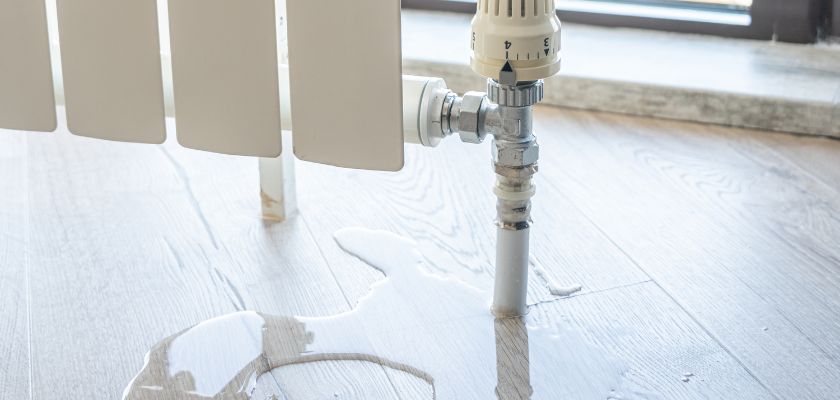Leaks in your home can lead to significant damage, increased utility bills, and a lot of stress. Understanding the different types of leaks and how to handle them is essential for maintaining your property and preventing costly repairs. Whether it’s a dripping faucet or a hidden slab leak, each type of leak requires specific attention and expertise. In this article, we will explore the most common types of leaks, the best methods for handling slab leaks, and when to seek professional help, such as North Richland Hills leak detection services.
Table Of Contents
The Most Common Types of Household Leaks

Leaks can occur in various parts of your home, from the roof to the foundation. Each type of leak presents its own challenges and potential risks. Here, we will discuss some of the most common household leaks.
Faucet and Showerhead Leaks
Faucet and showerhead leaks are among the most common and noticeable types of leaks. A dripping faucet or a leaky showerhead may seem like a minor issue, but it can waste a significant amount of water over time and lead to higher water bills.
Causes of Faucet and Showerhead Leaks
Faucet and showerhead leaks are usually caused by worn-out washers, gaskets, or seals. Over time, these components can deteriorate due to regular use, leading to leaks. In some cases, mineral buildup from hard water can also cause these leaks.
Fixing Faucet and Showerhead Leaks
Fixing a faucet or showerhead leak typically involves replacing the worn-out parts. This can usually be done with basic tools and minimal plumbing knowledge. However, if the leak persists, it may indicate a deeper issue, such as a cracked valve or pipe, which would require professional assistance.
Toilet Leaks
Toilet leaks are another common household problem. These leaks can occur either within the toilet itself or at the base, where the toilet meets the floor. Toilet leaks can lead to water waste and potential damage to your bathroom floor.
Causes of Toilet Leaks
Toilet leaks are often caused by a faulty flapper valve, which controls the flow of water from the tank to the bowl. If the flapper is worn out or misaligned, it can cause the toilet to run continuously, leading to leaks. Leaks at the base of the toilet are usually caused by a worn wax seal.
Fixing Toilet Leaks
To fix a toilet leak, start by checking the flapper valve. If it’s damaged, replace it with a new one. If the leak is at the base, you’ll need to replace the wax seal, which involves removing the toilet and reseating it. This can be a more complex job, so if you’re unsure, it’s best to call a professional.
Roof Leaks
Roof leaks can cause significant damage to your home if not addressed promptly. They can lead to water damage in your ceilings, walls, and even the structural integrity of your home.
Causes of Roof Leaks
Roof leaks are often caused by damaged or missing shingles, cracked flashing, or clogged gutters. Severe weather, such as heavy rain, snow, or wind, can exacerbate these issues, leading to leaks.
Fixing Roof Leaks
Fixing a roof leak typically involves replacing damaged shingles or flashing and clearing out any clogged gutters. For extensive damage, it’s advisable to consult a roofing professional who can assess the situation and provide the necessary repairs.
Understanding and Handling Slab Leaks
Slab leaks are among the most serious types of leaks a homeowner can encounter. They occur when water pipes under the concrete foundation of a home develop leaks. Handling slab leaks requires prompt attention, as they can cause significant structural damage to your home.
Causes of Slab Leaks
Slab leaks can be caused by several factors, including corrosion of pipes, poor installation, or shifting of the foundation. Over time, water pipes, especially those made of copper, can corrode due to chemical reactions with the surrounding soil. Poor installation practices can lead to pipes being damaged or improperly supported, increasing the likelihood of leaks. Additionally, natural settling or seismic activity can cause the foundation to shift, putting stress on the pipes and leading to leaks.
Signs of a Slab Leak
Identifying a slab leak early is crucial to minimizing damage. Some common signs of a slab leak include unexplained increases in water bills, damp or warm spots on the floor, the sound of running water when all faucets are turned off, and cracks in the walls or foundation. If you notice any of these signs, it’s important to take action immediately.
How to Fix Slab Leaks
Fixing a slab leak is not a DIY job and requires professional intervention. The most common methods for repairing slab leaks include pipe rerouting, pipe relining, and direct pipe repair. Pipe rerouting involves abandoning the old pipe and installing a new one along a different path. Pipe relining involves inserting a flexible liner coated with epoxy into the existing pipe, sealing the leak. Direct pipe repair involves accessing the leak by breaking through the concrete slab and repairing or replacing the damaged section of the pipe. North Richland Hills leak detection services are highly recommended to accurately locate and assess the leak before proceeding with repairs.
When to Seek Professional Leak Detection Services
While some minor leaks can be handled with DIY methods, others require the expertise of a professional. Knowing when to call in a professional can save you time, money, and prevent further damage to your home.
When DIY Repairs Aren’t Enough
If you’ve attempted to fix a leak and it persists, it’s time to call a professional. Persistent leaks can indicate a more serious underlying issue that requires specialized tools and expertise. For example, if you’ve replaced the flapper in a leaking toilet, but the leak continues, it may be due to a cracked tank or bowl, which would need professional repair.
The Importance of North Richland Hills Leak Detection
Professional leak detection services, such as North Richland Hills leak detection, are essential for locating and fixing hidden leaks that you may not be able to detect on your own. These services use advanced equipment like electronic leak detectors, thermal imaging cameras, and acoustic sensors to accurately pinpoint leaks without causing unnecessary damage to your property.
Choosing the Right Leak Detection Service
When selecting a leak detection service, it’s important to choose a company with a good reputation, experience, and the necessary equipment. Look for professionals who specialize in handling slab leaks and other complex plumbing issues. Reading customer reviews and asking for references can also help you make an informed decision.
Preventing Future Leaks
Prevention is always better than cure, and taking steps to prevent leaks in your home can save you a lot of trouble in the long run. Regular maintenance and inspections are key to preventing leaks.
Regular Plumbing Inspections
Scheduling regular plumbing inspections with a professional can help catch potential issues before they become major problems. During an inspection, the plumber will check for signs of wear and tear, corrosion, and other factors that could lead to leaks. This proactive approach can help prevent leaks from occurring and extend the life of your plumbing system.
Maintaining Your Roof
Regular roof maintenance is essential to prevent leaks. This includes inspecting your roof for damaged or missing shingles, clearing out gutters, and ensuring that flashing around chimneys and vents is intact. Regular maintenance can help you catch and fix minor issues before they lead to significant leaks.
Upgrading Plumbing Materials
If your home has older plumbing made of materials prone to corrosion, consider upgrading to more durable materials like PEX or PVC. These materials are less likely to corrode and can help prevent future leaks. Discuss your options with a professional plumber to determine the best choice for your home.
Final Wording
Understanding the different types of leaks and how to fix them is crucial for maintaining the integrity of your home. From minor faucet drips to serious slab leaks, each type of leak requires specific attention and expertise. Regular maintenance, timely repairs, and professional services like North Richland Hills leak detection can help you stay on top of potential issues and prevent costly damage. By being proactive and informed, you can effectively manage and prevent leaks, ensuring your home remains safe, dry, and in good condition for years to come.
FAQ’s
1. How can I tell if I have a slab leak in my home?
Common signs of a slab leak include unexplained increases in your water bill, damp or warm spots on the floor, the sound of running water when all faucets are turned off, and cracks in the walls or foundation. If you notice any of these signs, it’s important to address the issue promptly.
2. What are the most effective methods for handling slab leaks?
Handling slab leaks typically involves one of three methods: pipe rerouting, pipe relining, or direct pipe repair. The best method depends on the severity of the leak and the condition of your pipes. Consulting with a professional leak detection service, such as North Richland Hills leak detection, is recommended for accurate diagnosis and repair.
3. Can I fix a leaking faucet or showerhead on my own?
Yes, most faucet and showerhead leaks can be fixed with basic tools and a little DIY knowledge. The most common cause is a worn-out washer, gasket, or seal that can be replaced easily. However, if the leak persists after these repairs, it may indicate a more serious issue that requires professional attention.
4. When should I consider calling a professional for leak detection?
You should call a professional for leak detection if you suspect a hidden leak, such as a slab leak, or if you’ve attempted DIY repairs on a visible leak but it persists. Professional services like North Richland Hills leak detection use advanced tools to accurately locate leaks and recommend the best repair methods.
5. How can regular plumbing inspections prevent leaks?
Regular plumbing inspections can catch potential problems before they turn into major leaks. A professional plumber can identify signs of wear and tear, corrosion, and other issues that may lead to leaks, allowing you to address them before they cause significant damage.







